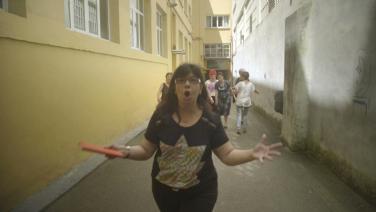
Ninth of twelve-part series that explores the changing production model by which the old tobacco factory became the current International Cultural Centre. Lurking two big questions: what do we need from the past when it comes to work? and how and from where one can speak of memory ?.
Tabakalera embodies these and many other issues, which has allocated a small space in the building, Storage, where the series is shown as a video installation, adding a chapter each mid-month, starting from the inauguration on September 11, until September 2016. The project by Cruza Marte, is accompanied by a public side events.
Chapter 9 (25'12'') - INVOKING DEMISE
A reader once reproached me for having chosen a theatre director as the main character of my story:
“I understand that you have not been able to avoid falling madly in love, as you have been living with writing for so many years in the same way as if you had been sharing a flat with someone almost without speaking to each other and then you finally crossed the fine partition separating the rooms. And that that love out of the blue feels like something that has always been there, as it occurs between two people who, even though they do not know each other, have lived together for so, so many years. I believe that in turn that this love comes with the overwhelming need, nearly like a fever, to recover lost time. And that, therefore, the situation is overtaken by the inordinate force of writing driven by its own hunger, performing stunts and acrobatics, in an endeavour driven by the belief of being the act of fair and expected redress. What I cannot manage to explain is why from the range of characters that you could have put at the centre of your tale, you have chosen an intellectual, a theatre director, and relegated your fellow workers, that "group of women who worked together" that appears as a subtitle and which, in my opinion, generates false expectations, to a sort of choir, appearing at odd times and stripped from the uniqueness that any of your fellow workers would have deserved”.
What can I say? It is true. I did not decide to write for ethical reasons, or due to an awakening of faith, or a flight of fancy, or due to commotion, misgiving or disdain in the face of failure… Or the truth, as libel against that Othello that the paid worker always was, but because I was urged to do so. Tremendous urges, such as those that took me to Igeldo in company of the first one to touch my breast.
Urges that, when all said and done, are not ruled by profits, but rather by content. I fell into the trap and I was already filled with every type of regret, when a responsibility of all the unfairness of my position in this matter had to be added to my ignorance. I did not want to or dreamt of being a chronicler of any era. Ask the question, “what do you think of the past?” and the answer will be: it weighs me down! So how could my back, which is already painful, bear the burden of the past of a whole factory? And what about a factory? A whole production system, a giant that collapsed after existing for three centuries!
I sometimes think that a certain degree of foresight revealed to us the demise of the industrial world that had been ours, of our mothers, of our mothers' mothers and even of their mothers. Something similar to a vision that is repeated and scattered to the point of even seeming like an apparition: abnormal, foreign, outside the common reality, certain, but incisively significant, much more than that culture, than the community of opinions, thoughts, views, affections and disaffections that formed that such logical culture, that was so self-confident, so affected, so old-fashioned, just like that industrial setting where, sincerely, we were crushed. A situation from which, let us not fool ourselves, we wanted to escape. There is now nostalgia for the smoke in the cities, but back then, it caused suffering.
Regarding this, and please allow me this aside, I would like to raise a point. I have read a great deal about work, that backbone of human activities. There is consensus about the demarcation of a historical though blurred line, separating industrial work from the new work (what is the so-called new work exactly? Is it really new? Or rather is it that the conditions in which it is produced are new? And even so, are they really new or are there transhistorical aspects in them and what is new is the combination of their current forms?). This new work is located somewhere beyond the service sector, in the servicetude and it basically consists of extending the yield of our workforce in a process of time and space dispersion. Those people who insist that such a division exists in general commit the small error of assuming that the previous work was a simpler concept than the current one. Work has always been a highly complex force of attraction and expulsion. Paid employment, for example, can only be expected to be the subjugation of the different human realities to a common systemizer (an activity, a salary) and it was therefore always culturally destructive. That does not mean that it would be perceived as such. It would be impossible to do so. As a euphemism of exploitation, work emerges out of the historical mainstreaming of an accident. Implicit is the crushing of time which is inherent to the accident and therefore produces an overwhelming urgency among those who work. What is a “work culture” then? Or in other words, under what conditions? In this regard, women workers have always walked on burning embers.
Ninth of twelve-part series that explores the changing production model by which the old tobacco factory became the current International Cultural Centre.
